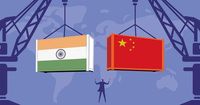In a rapid response to impending tariffs, Apple successfully transported five planes filled with iPhones and other products from India and China to the United States in just three days during the final week of March 2025. This urgent shipment was initiated to circumvent a new 10% reciprocal tariff imposed by former President Donald Trump’s administration, which took effect on April 5, 2025, according to a senior Indian official speaking to The Times of India.
Despite the looming tariffs, Apple has indicated that it currently has no plans to raise retail prices in India or other markets. The company has been proactive, with factories in India and China shipping products to the U.S. in anticipation of the tariff changes. A source familiar with the situation noted, "Factories in India and China and other key locations had been shipping products to the US in anticipation of the higher tariffs." This strategy has allowed Apple to stock its U.S. warehouses for several months ahead, mitigating potential price increases.
Furthermore, the Trump administration announced an additional 26% reciprocal tariff set to be implemented on April 9, 2025. This escalation is likely to influence Apple’s manufacturing strategy moving forward. With Indian exports facing a 26% reciprocal tariff to the U.S. compared to the 54% levied on Chinese goods, Apple is positioned to benefit from this significant disparity. The company already accounts for most of India's nearly $9 billion in smartphone exports to the U.S., making India a crucial player in Apple's global production network.
As Apple navigates these changes, the company is analyzing how different tariff structures across manufacturing locations will affect its supply chain. The U.S. remains a vital market for Apple products, and the company is keen on avoiding passing increased costs onto consumers, which could dampen demand and profit margins. Sources indicate that any price hikes would not be limited to the U.S. market but would need to be implemented across key global regions, including India.
While Apple works to manage its supply chain amidst these tariffs, geopolitical tensions are also at play. Following the announcement of the U.S. tariffs, China reached out to India, proposing a united front against what they termed the "abuse" of tariffs by the U.S. New Delhi has opted to avoid engaging in a war of words with the Trump administration, unlike Canada and China.
In the midst of global trade uncertainties, India is actively seeking to strike more trade deals with various countries. Finance Minister Nirmala Sitharaman recently expressed optimism about finalizing a free trade deal with the United Kingdom in the near future. Speaking at the Indian high commission in London, she noted, "Global uncertainties are multiplying by the day, which is driving many countries to clearly be active on [seeking] bilateral arrangements that go beyond their old ideological and political ties."
India has been making strides in forming bilateral agreements, having recently signed deals with Australia, the UAE, and Oman. However, the path to trade agreements can be lengthy; an agreement with the European Free Trade Association took 16 years to negotiate. Currently, UK ministers are accelerating trade negotiations with India, which have been ongoing since January 2022, in an effort to offset the impact of U.S. tariffs.
On April 9, 2025, Sitharaman is scheduled to meet with UK Chancellor Rachel Reeves to discuss the ongoing negotiations. Reeves has emphasized the importance of these trade talks, stating, "In a changing world, this government is accelerating trade deals with the rest of the world to back British business and provide the security working people deserve." The discussions are expected to cover a variety of topics, including mutual recognition of professional qualifications and collaboration in science and technology.
Among the issues on the table is the processing of Indian workers in the UK. India has expressed concerns regarding the national insurance contributions required from business visa holders, who are not eligible for UK pensions or social security benefits. This sticking point highlights the complexities involved in negotiating a mutually beneficial trade agreement.
As both Apple and the Indian government navigate the challenges posed by tariffs and trade negotiations, the outcome of these discussions will likely have significant implications for global trade dynamics. With the U.S. market remaining crucial for Apple and India's growing role in its supply chain, both entities are poised to adapt to the shifting landscape of international trade.
In conclusion, the interplay of tariffs, trade agreements, and geopolitical relations is shaping the future of global commerce. As companies like Apple and nations like India seek to secure their positions in this evolving environment, the impact of these decisions will resonate across markets worldwide.






